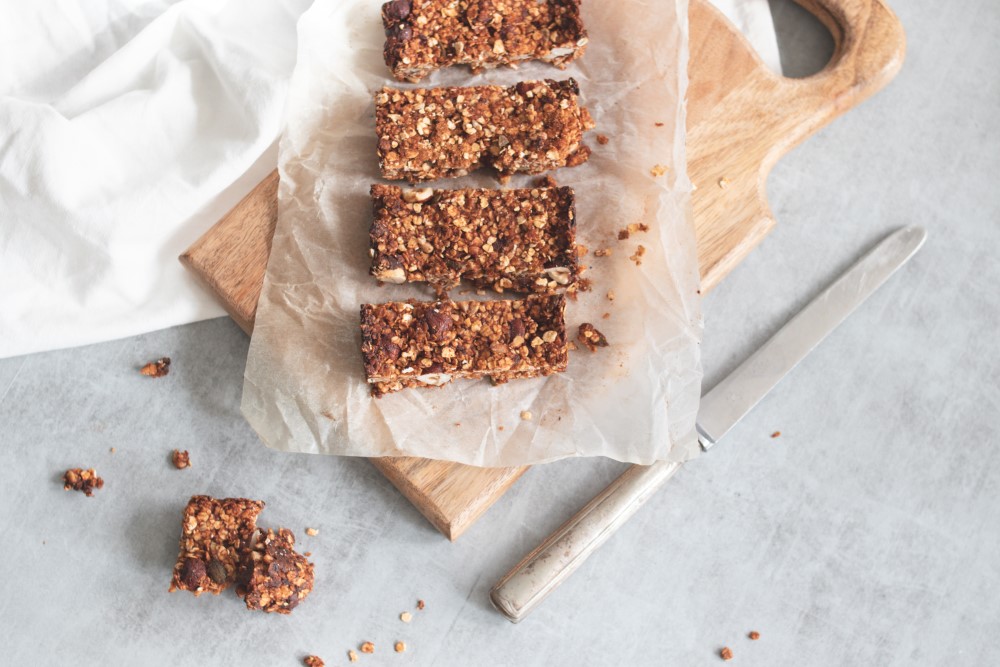
Credits to Annelies Brouw
It can be easy to assume that certain foods are healthy based on their marketing or popular opinions, but the reality is that some foods might not be as nutritious as we once thought. Here are some examples of foods that might not be as nutritious as you thought:
- Granola Bars
Granola bars are often marketed as a healthy snack option, but many store-bought granola bars are high in sugar and calories and may contain additives and preservatives. Instead, opt for homemade granola bars made with whole food ingredients like nuts, seeds, and dried fruit. - Fruit Juice
Fruit juice can be a convenient way to get in some fruit servings, but many fruit juices are high in sugar and lack the fiber and nutrients found in whole fruit. Instead, opt for whole fruit or make your own fresh fruit juice with a juicer or blender. - Energy Bars
Similar to granola bars, many energy bars are high in sugar and calories and may contain additives and preservatives. Instead, opt for whole food snacks like fresh fruit, nuts, or homemade energy bites made with whole food ingredients like dates, nuts, and seeds. - Veggie Chips
Veggie chips are often marketed as a healthier alternative to potato chips, but many veggie chips are high in sodium and lack the fiber and nutrients found in fresh vegetables. Instead, opt for fresh vegetables like carrots, celery, or cucumber slices paired with a healthy dip like hummus. - Flavored Yogurt
Flavored yogurt is often high in sugar and may contain additives and preservatives. Instead, opt for plain yogurt and add your own fresh fruit or a small amount of honey or maple syrup for sweetness. - Gluten-Free Products
Gluten-free products like breads and crackers can be a good option for those with celiac disease or gluten sensitivity, but many gluten-free products are highly processed and lack the nutrients found in whole grain products. Instead, opt for whole grain breads and crackers made with ingredients like whole wheat or spelt flour. - Protein Bars
Similar to energy bars, many protein bars are high in sugar and calories and may contain additives and preservatives. Instead, opt for whole food sources of protein like lean meats, beans, or nuts. - Sports Drinks
Sports drinks are often marketed as a way to replenish electrolytes and rehydrate after exercise, but many sports drinks are high in sugar and calories. Instead, opt for water or coconut water, which can help replenish electrolytes without the added sugar. - Instant Oatmeal
Instant oatmeal can be a convenient breakfast option, but many instant oatmeal packets are high in sugar and lack the fiber and nutrients found in whole grain oats. Instead, opt for steel-cut oats or rolled oats made with whole food ingredients like nuts and fresh fruit. - Fat-Free Salad Dressing
Fat-free salad dressing is often marketed as a healthier option, but many fat-free salad dressings are high in sugar and lack the healthy fats found in olive oil or avocado. Instead, opt for homemade salad dressing made with healthy fats like olive oil or avocado. - Veggie Burgers
Veggie burgers can be a good option for those looking to reduce their meat consumption, but many store-bought veggie burgers are highly processed and may contain additives and preservatives. Instead, opt for homemade veggie burgers made with whole food ingredients like black beans, quinoa, and sweet potato. If you are at a restaurant looking for a vegetarian option, it might be a good idea to request a mushroom patty, for instance, rather than a product made with additives and preservatives. Not all vegetarian patties are made equal. - Smoothies
Smoothies can be a convenient and delicious way to get in some fruits and vegetables, but many store-bought smoothies are high in sugar and lack the fiber and nutrients found in whole fruits and vegetables. Instead, opt for homemade smoothies made with whole food ingredients like fresh fruit, spinach, and almond milk. - Gluten-Free Snacks
Similar to gluten-free products, many gluten-free snacks like crackers and chips are highly processed and lack the nutrients found in whole grains. Instead, opt for whole food snacks like fresh fruit, nuts, or raw vegetables. - Protein Powder
Protein powder can be a convenient way to add extra protein to your diet, but many protein powders are highly processed and may contain additives and artificial sweeteners. Instead, opt for whole food sources of protein like lean meats, beans, or nuts. - Baked Goods
Baked goods like muffins, cookies, and cakes can be high in sugar, refined flour, and unhealthy fats. Instead, opt for homemade baked goods made with whole grain flours, natural sweeteners like honey or maple syrup, and healthy fats like coconut oil or nut butter. - Canned Soup
Canned soup can be a convenient option for a quick meal, but many canned soups are high in sodium and may contain additives and preservatives. Instead, opt for homemade soup made with whole food ingredients like fresh vegetables and lean meats. - Frozen Dinners
Frozen dinners can be a convenient option for busy weeknights, but many frozen dinners are high in sodium, unhealthy fats, and preservatives. Instead, opt for homemade meals made with whole food ingredients like fresh vegetables, lean meats, and whole grains. - Dried Fruit
Dried fruit can be a convenient and delicious snack, but many dried fruits are high in sugar and lack the water and nutrients found in fresh fruit. Instead, opt for fresh fruit or homemade fruit leather made with whole food ingredients like fresh fruit and natural sweeteners.
By being mindful of these potentially less nutritious foods and making healthier choices, you can support overall health and well-being. Additionally, focusing on whole foods and nutrient-dense options can help ensure that you are getting all of the important nutrients your body needs to thrive.